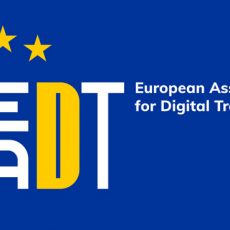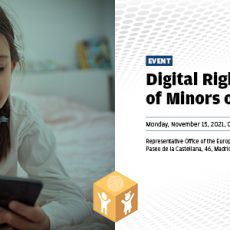
The report by the expert working group on the protection of minors in the online environment has entered a new phase. On Tuesday, December 3rd, the report was submitted to Spain’s Council of Ministers, culminating almost nine months of work by the Committee of Experts. This group of fifty professionals was created by the Spanish Ministry of Youth and Children to propose the best measures to take in the face of a growing problem: the negative impacts of digitalisation on children and adolescents, with phenomena such as cyberbullying, the selling of their personal data, mental health problems due to exposure on social networks, or the impact on their emotional and sexual relationships as a result of exposure to pornographic content.
The document, which proposes 107 measures, highlights the growing process of digitalisation and its impact on children and youths, which requires precise identification of the risks and specific measures to guarantee the rights of children in the digital realm. To prepare its diagnosis under the presidency of Ana Caballero, who is also vice-president of the European Association for Digital Transition, a comprehensive and multidisciplinary approach has been followed, in line with the impact of digitalisation on children and adolescents.
The document also warns of the impact on neurodevelopment that the use of digital devices in formative stages can produce. The report notes that the first years of life are crucial for cognitive and social development, and that overuse of screens in children under two years of age can have adverse effects. In adolescence, it warns about possible negative effects on psycho-affective development, linked to the increase in mental health problems such as anxiety and depression.
Focus on the best interests of the child
One of the fundamental principles of the document, starting from these premises, is to put the focus on the best interests of the child. Therefore, the Committee recommends stricter regulations and supervision to protect children and adolescents, prioritising their physical, emotional and educational well-being.
Experts emphasise the responsibility of the technology industry in protecting children and adolescents in the digital realm. Technology platforms and device manufacturers are therefore urged to take proactive measures that include age verification, effective parental controls, and restrictions on access to harmful content for minors.
“The business model of the large Internet platforms harms minors”, asserts Ana Caballero, “and in the course of the work by the expert committee we have seen that they have very little interest, or none at all, in changing it. This is why civil society has to be firm in demanding they accept their responsibility and that the public authorities act firmly”.
Families and the educational system play a crucial role in supervising and guiding children in the use of technology. The document highlights the importance of the family being involved, the use of parental controls, and the need for effective digital education in schools. Media literacy is seen as a key tool to encourage critical and responsible use of technology, but “always taking into account the responsibility of the technology platforms”, emphasizes the chair of the Committee of Experts. Some of the measures, such as restrictions on the use of filters on TikTok by minors, seem more cosmetic than effective, given the nature of its business model, which is based on holding their attention.
Likewise, the report raises the need to integrate a gender perspective when confronting the digitalisation of minors, since girls and adolescents are more susceptible to suffering attacks online, and of all different kinds. Thus, the Committee notes the urgency of implementing more effective protection tools and sanctions to address this problem.
In the conclusions, the experts advocate robust public policies and an updated regulatory framework that ensures the protection of minors in the digital realm. The document calls for an updating of existing laws, stricter regulation of digital business practices and the creation of safe environments that respect the rights of minors, protecting their privacy and preventing their economic exploitation through use of their data.
It is, therefore, now the time for public policies by the different administrations. If they do not act with determination, the algorithm will continue winning the battle over families and teachers.




